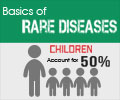- Seventy million children and adults suffer from a rare disease in India
- The idea of an Open Platform for Rare Diseases (OPFORD) is to provide quality, verified information and support for rare diseases
- Connecting patients to resources like doctors, clinical geneticists, treatment centers and patient groups enable and empower patients and their families
OPFORD is the first digital platform in India to bring together rare disease resources and the platform is modeled on the example of OpenPediatrics (developed and maintained by Boston Children’s Hospital). OPFORD will also go beyond the digital to provide care coordination, genetic counselling and support and also develop genetic literacy programs for the Indian public. OPFORD was well-received by the audience at the symposium and appreciated by Dr. Kiran Mazumdar-Shaw who went on to tweet about the platform.
What are Rare Diseases?
Rare diseases as the name implies are rare conditions affecting a small number of people. While each rare disease may have small numbers, together almost 350 million people across the globe suffer from some form of a rare disease. In India, nearly 70 million children and adults have a rare disease. The prevalence of rare diseases in the Indian population is 7.5 out of 10,000. Rare diseases include autoimmune condition and rare cancers.Eighty percent of all rare diseases are genetic in origin. Nearly fifty percent of those affected are children of which thirty percent will not live beyond the age of 5. In India, lack of multidisciplinary centers, issues of access and dire poverty; it takes nearly 7-8 years to diagnose a rare condition by which time it is too late to take interventional measures.
Lack of multidisciplinary centers to provide diagnostic and treatment support adds up to the woes of patients and families. More often than not, clinicians themselves are not familiar with rare diseases and a patient may see around 6-7 doctors before they finally get diagnosed. Apart from a long diagnostic odyssey, treatment and drugs are often so expensive and prohibitive that even middle class families cannot afford it. Ill-equipped government hospitals and treatment centers are unable to provide even basic therapeutic support for rare diseases. Non-existent health insurance for rare, genetic disorders and public health system failures leave rare disease patients dependent on pharma charity access programs. Enzyme Replacement Therapies (ERTs) for rare disease groups like the lysosomal storage disorders (LSDs) range from 1 crore to 4 crores per patient annually. Currently, patients with Gaucher, Pompe and Fabry are surviving on Sanofi Genzyme’s charity access program which ensures regular supply of ERTs.
The National Policy for Treatment of Rare Diseases 2017 earmarked a corpus fund of 100 crores for treatment of such rare diseases. However, this is a one-time fund and it is not clear how many patients can be supported and sustained on a limited fund. Clearly, India needs a better model of healthcare finance and treatment for its rare disease population.
- Open Platform For Rare Diseases - (http://opford.org/)










